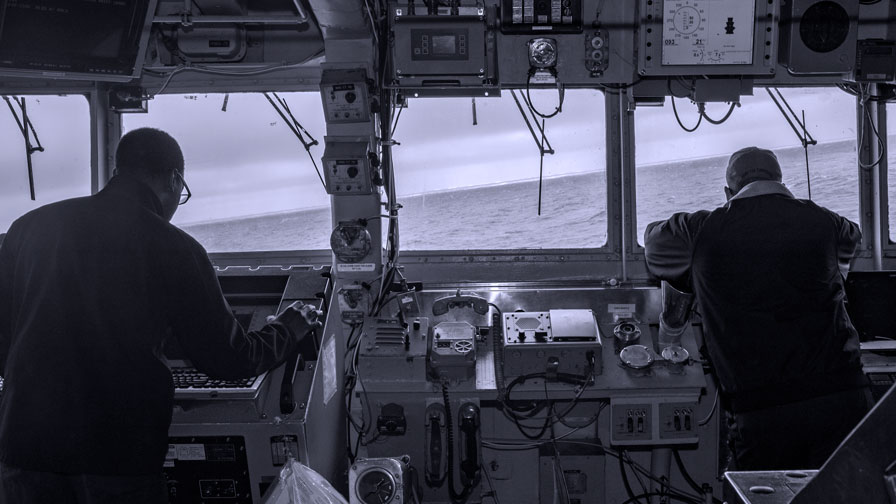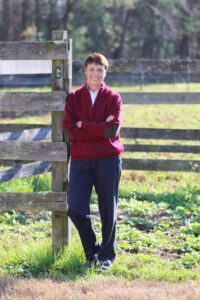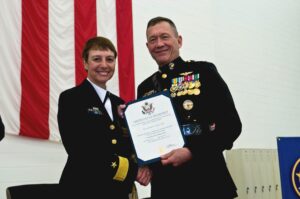
Darden Delivers Program to the U.S. Navy That Accelerates Strategic Thinking for Senior Officers
By Aine Doris
Since 1973, UVA Darden Executive Education & Lifelong Learning has worked with the U.S. Navy to deliver learning experience to upskill officers through the top echelons of command.
The U.S. Navy Strategic Thinking (NST) program, a flagship critical thinking and decision-making program delivered to U.S. Navy and Marine Corps flag officers, Senior Executive Service (SES) personnel and international flag officers from selected allied navies with the highest level of enterprise-wide responsibility, is a game changer.
The program broaden participants’ perspectives, enhances leadership capabilities and drives positive tactical and strategic change. Participants emerge with new understanding, skills and resources. They acquire the ability to see the bigger picture and the longer view. They are empowered to find creative solutions to existing and emerging problems in an unstable world. And they gain the critical decision-making capabilities to support national security strategy at every level of command. Currently in its 12th year of deployment, the program has comprehensively upgraded the skills and aptitudes of 24 cohorts and 640 Navy officers & SES personnel since its inception.

Rear Admiral C.J. Jaynes managed several programs for the Navy and was a participant in the inaugural UVA Darden NST program.
Rear Admiral C.J. Jaynes was one of the U.S. Navy’s most active proponents of training and education. During her 33-year career in the Navy, she was honored for her service on multiple occasions, and in 2012 became the first female flag officer, a Rear Admiral, in the Naval Air Systems Command. A three-time recipient of the Legion of Merit and holder of an MBA from Norwich University, Jaynes managed several programs for the Navy and was a participant in the inaugural UVA Darden NST program. She recently reflected on her experience with us.
Q: How did you become involved with UVA Darden and the NST program?
A: It’s funny how I got started with Darden. Back in 2000, I was Officer-In-Charge of the Aircraft Intermediate Detachment at Lemoore in California, and things weren’t going well. Productivity was down while maintenance crews were working at capacity — morale was at rock bottom. I’d been part of a project with Northrop Grumman, the aerospace and defense technology company, where I’d seen lean manufacturing in action based on the Toyota model. Based on what I’d witnessed, I decided to implement the same approach in Lemoore with the people under my command.
This was a strategic change. It turned production right around and caught the attention of Navy Leadership who progressed lean manufacturing through to other operations. We’d managed to find a solution that was less about saving money and more about changing the culture and the way we do business as an organization. I was invited to write a case study about the experience by UVA Darden, and that’s where my long association with the School began. I kept going back to Darden as I progressed in my career because of our mutual interest in making the shift to strategic thinking and leading change within the organization— in my case, a military organization. After participating in the program in 2012, I was invited back as a guest lecturer for the program in 2013 as I had first-hand experience of using strategic thinking to shift culture.
Q: What kinds of challenges are in front of senior decision-makers in an organization like the Navy? Is it difficult to make the shift to strategic thinking?
A: I think the first hurdle is really getting participants to understand that it’s actually OK to do things differently. Teaching in the NST program, my first objective was to encourage students to look up and out, and see that there are opportunities out there.
In organizations like the U.S. Navy, there are clear chains of command and the biggest thing is getting your boss to agree to let you get out there and go and try new things without worrying about the processes and procedures. So it’s key to know your facts. It’s really about having clarity around your data and finding a starting point and an advocate who’s going to support you in making that leap and changing the strategy of the organization. In my own experience, I’ve had more than one officer tell me to sit down and be quiet when I’ve wanted to change things. So you really need the backing of people who believe in you to get started.
Working with students in the NST program, the biggest question I typically ask is: are you willing to take a chance and are you willing to fail? Making that shift to strategic thinking and trying to institute change takes courage, and you have to be able to take the heat if it doesn’t work. When you are a junior officer, it’s all too common to not want to buck the system. But as you progress up the ranks, you should start to open up in your thinking. And in this sense, the Navy is no different from any organization. The Navy operates a culture that really is open to change and to having its officers pursue change.
Q: Describe your experience teaching in the NST program — and teaching your peers in particular?
A: The module of the program that I taught was focused on taking students through the case study that I’d written with Darden professors. So we were looking at our own data and exploring the outcomes in making that strategic shift.
What was so rewarding about teaching this case study was having the data all laid out in front of us — and it’s hard to argue with the data. You can clearly see the impact of making that strategic switch to lean manufacturing just in terms of the production figures. It’s really hard to argue with facts.
In terms of teaching my peers, I have to say it was a lot of fun. Students really related to the challenges and the situations we outlined in the case study. They could immediately grasp the need to find support from advocates to feel empowered to think strategically and make changes. For me personally, it was rewarding to be able to say to them: I’m just like you and I understand your perspective. I was still a commander when I took this leap and instituted lean manufacturing at Lemoore.
Q: What kind of impact do you think NST has had on the Navy?
A: I think that the Darden program offers officers a really big opportunity to learn something outside of the Navy — and to experience one of the very best business schools in the country. Here is a program that is quite unlike anything you will learn inside the Navy, which is typically focused on the technical content, flight training and learning your trade.

Rear Admiral C. J. Jaynes receives her retirement certificate from U.S. Marine Corps Lieutenant General Jon M. Davis during a ceremony Apr. 1, 2023, at Naval Air Station Patuxent River, Maryland. Jaynes officially retired May 1 after serving in the U.S. Navy for 33 years. Photo: U.S. Navy
As you progress in an organization like the U.S. Navy, you look for opportunities to really expand your expertise and your thinking. In the cohorts that go through NST, you have participants that have been selected on this basis — these are the newly selected Flag officers, as well as the civilians from our Senior Executive Service. Bringing these learners together to accelerate strategic thinking capabilities is a serious investment in the future for the Navy. And the act of bringing them together in the same learning program — officers and civilians — creates a vibrant learning dynamic. Civilians bring a different culture; one that is not perhaps so predicated on doing what the boss says. So there’s a wonderful exchange of perspectives that really helps open their minds as students are equipped with the tools to go forward with new ideas focused on the enterprise.
Just taking people out of a job setting and bringing them together from SES, from the ship and aviation contexts — it creates an incredible networking experience and opportunity. I’ve not met anyone who’s been through this program and said it is anything other than top notch.
Q: How has the program impacted you personally?
A: It has given me scope to share my own story and impact so many other people. And it has allowed me to share that really important message around having the courage to think and to do things differently. If just one person who takes this program goes on to replicate the model we share in the case study, the impact is unimaginable.
Personally, for me it is also a huge honor to be part of the program and to have been selected by Darden as a lecturer and presenter.
Q: What are your thoughts on the importance of learning and ongoing development?
A: To answer that you just have to look at my own career. I have my BSc, my master’s and MBA. For me, learning is a lifelong activity. I’ve made a career out of educating myself and pushing myself outside my comfort zone. And as I’ve retired from the Navy, I’ve continued to learn and I’ve made a habit of the courage it takes to keep on doing that. Learning never ends.
The wonderful thing that Darden offers is the continuous opportunity to learn something new and different. And that’s the challenge the school offers to officers. As aviators we are essentially engineers — we’re very structured in our thinking. The NST is an amazing opportunity to go back into the classroom, challenge what you think you know and open your mind to learning something totally different.
The University of Virginia Darden School of Business prepares responsible global leaders through unparalleled transformational learning experiences. Darden’s graduate degree programs (MBA, MSBA and Ph.D.) and Executive Education & Lifelong Learning programs offered by the Darden School Foundation set the stage for a lifetime of career advancement and impact. Darden’s top-ranked faculty, renowned for teaching excellence, inspires and shapes modern business leadership worldwide through research, thought leadership and business publishing. Darden has Grounds in Charlottesville, Virginia, and the Washington, D.C., area and a global community that includes 18,000 alumni in 90 countries. Darden was established in 1955 at the University of Virginia, a top public university founded by Thomas Jefferson in 1819 in Charlottesville, Virginia.
Press Contact
Molly Mitchell
Senior Associate Director, Editorial and Media Relations
Darden School of Business
University of Virginia
MitchellM@darden.virginia.edu




